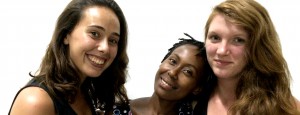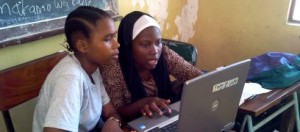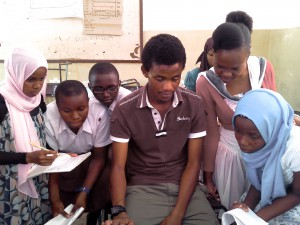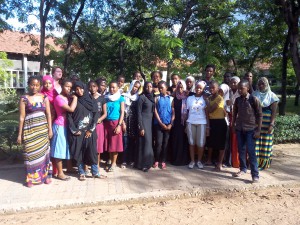W4’s field project Why-Not Women is working to promote women’s social entrepreneurship around the world. For the next year, its co-founders, Mathilde and Bérengère, are undertaking a global tour to help 6 women social entrepreneurs grow their businesses and expand their social impact.
Mathilde and Bérengère recently went on a mission to help Carolyne Ekyarisiima, Founder of W4’s field project in Tanzania, Apps and Girls, which runs free coding clubs for girls in an effort to redress the country’s alarming gender gap in ICTs.

Apps and Girls has trained more than 240 girls since June 2013 and is currently partnering with 9 primary and secondary schools in Dar Es Salaam. Girls learn how to code their own websites — websites that they design to be used to find solutions to social issues that the girls themselves have identified.
At the end of the year, the girls attend the Annual Hackathon and Competition, where they can submit their projects with the chance to win grants, free trainings and free website hosting.
Apps and Girls also provides ICT trainings for housewives, known as “Mamas”. Through its “Tecknomama” program, women are taught how to use their phones and computers properly, enabling them to increase their own businesses’ profitability and help their daughters with ICT-related homework.
After spending a month working with Carolyne and her team, Mathilde and Bérengère tell us more about Apps and Girls’ life-changing programs.
What inspired Carolyne to found Apps and Girls?
 |
Carolyne Ekyarisiima graduated with a degree in ICT and went on to become an ICT teacher at Kampala International University in Dar Es Salaam, Tanzania. As an instructor, she was always puzzled to find so few women in her classes, while men seemed eager to take her courses. Carolyne opened coding clubs within the university in order to encourage women to pursue ICT-related curricula. However, she soon realized that she needed to target younger girls if she was to make sure that the next generation of female students would undertake tech courses.
What kind of challenges has Apps and Girls encountered in developing and operating its programs?
Apps and Girls is currently facing several development challenges. First, a lack of computers and IT equipment is preventing the organization from welcoming more girls into its coding clubs and trainings. Second, some parents refuse to allow their daughters to continue classes in coding and computer science because they believe that the Internet is somehow “spoiling” their girls. Carolyne quotes what she has heard from some of the girls. Some students have already been forced to quit the program because of their parents’ beliefs and/or their unwillingness to invest in girls’ education.
What is the potential of ICTs in accelerating positive change for girls and women across the globe?
Carolyne is deeply convinced that ICTs are powerful tools for empowering women and amplifying their voices far and wide. She thinks that ICTs have enormous potential to enable women to access better-paid jobs, develop their own businesses and learn about their rights. When we interviewed girls participating in Apps and Girls’ programs, we saw that the girls had become fully aware of their potential to go to university, find a decent job, and become changemakers. This is only possible, however, if women have basic ICT skills and adequate access to computers.
What is on the horizon for Apps and Girls in the coming years and how can individuals support their work?
First of all, Carolyne plans to partner with even more schools. “We are planning to build a mobile lab in order to reach other schools in other areas,” she explains.
But how can individuals help Apps and Girls?
 |
It’s easy: you can get involved by sponsoring girls’ participation in its coding clubs!
Alternatively, you can send computers, share Carolyne’s story or, even better, go to Tanzania for an unforgettable experience as a volunteer ICT teacher, business developer or designer!
See Mathilde and Bérengère’s full interview with Carolyne below:
© Women’s WorldWide Web 2015














